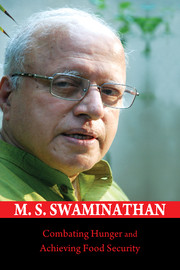Book contents
- Frontmatter
- Contents
- Foreword
- Preface
- Acknowledgements
- Abbreviations
- 1 Genesis and Growth of the Yield Revolution in Wheat
- 2 Our Agricultural Heritage
- 3 Shaping Our Agricultural Destiny
- 4 Thrust on Farm Revival
- 5 Nutri-farm Movement
- 6 Nutrition-sensitive Agriculture
- 7 Food Losses and Food Waste
- 8 Rice in Zero Hunger Challenge
- 9 Monsoon Management
- 10 Importance of Ecological Conservation
- 11 Caring for Ecology and Heritage
- 12 Conserving Biodiversity
- 13 Overcoming Hidden Hunger through Aquaculture
- 14 Biofuels – The Way to Go
- 15 Food Security
- 16 Vigilance for Sustainable Food Security
- 17 Food Security and Social Protection
- 18 Food Security and its Role
- 19 Sustaining the Livestock Revolution
- 20 Challenges in the Year of Science
- 21 Agriculture and Humanism
- 22 Fostering the Science of Science Communication
- 23 Olympic Move for Saving Children
- 24 Youth: The Agents of Change
- 25 Role of Women in Agricultural Production
- 26 Know-how to Do-how
- 27 From Bengal Famine to Right to Food
- 28 Financial Institutions and Fighting Food Inflation
- 29 Public Good Research in Agriculture
- 30 The Future of Indian Agriculture
- Bibliography
22 - Fostering the Science of Science Communication
Published online by Cambridge University Press: 18 December 2015
- Frontmatter
- Contents
- Foreword
- Preface
- Acknowledgements
- Abbreviations
- 1 Genesis and Growth of the Yield Revolution in Wheat
- 2 Our Agricultural Heritage
- 3 Shaping Our Agricultural Destiny
- 4 Thrust on Farm Revival
- 5 Nutri-farm Movement
- 6 Nutrition-sensitive Agriculture
- 7 Food Losses and Food Waste
- 8 Rice in Zero Hunger Challenge
- 9 Monsoon Management
- 10 Importance of Ecological Conservation
- 11 Caring for Ecology and Heritage
- 12 Conserving Biodiversity
- 13 Overcoming Hidden Hunger through Aquaculture
- 14 Biofuels – The Way to Go
- 15 Food Security
- 16 Vigilance for Sustainable Food Security
- 17 Food Security and Social Protection
- 18 Food Security and its Role
- 19 Sustaining the Livestock Revolution
- 20 Challenges in the Year of Science
- 21 Agriculture and Humanism
- 22 Fostering the Science of Science Communication
- 23 Olympic Move for Saving Children
- 24 Youth: The Agents of Change
- 25 Role of Women in Agricultural Production
- 26 Know-how to Do-how
- 27 From Bengal Famine to Right to Food
- 28 Financial Institutions and Fighting Food Inflation
- 29 Public Good Research in Agriculture
- 30 The Future of Indian Agriculture
- Bibliography
Summary
Sir Asutosh Mookerjee in his Presidential Address to the First Indian Science Congress in 1914 made the following remarks:
What is of the greatest importance in our present condition – on the one hand, bring home to the commercial community the inestimable value of science as an essential factor of industrial regeneration, and, on the other hand, make the landed aristocracy realise that science enables us to solve difficult agricultural problems and thereby revolutionise agricultural methods.
It is apt to remember these words in the context of the new paradigm in our science, technology and innovation (STI) enterprise, viz., ‘science, technology and innovation for the people’, introduced in the Science, Technology and Innovation Policy 2013 released by the Prime Minister of India during the Centenary Session of the Indian Science Congress. The STI Policy also calls for positioning India among the top five global scientific powers by 2020.
Since the new STI paradigm calls for attending to the needs of the people, it may be worthwhile to keep in mind that India's unenviable position today in various global indicators related to human development and nutrition is the following:
• malnourished children under 5 – above 40 per cent;
• low birth weight children – 21 per cent;
• undernourished people – about 217 million;
• sixty-fifth position among 79 countries in Global Hunger Index 2012;
• one hundred and thirty-fourth position among 187 countries in UNDP's Human Development Report 2012; and
• very low position in the nutrition barometer.
It is obvious that we have to redouble our efforts in harnessing science for meeting the needs of our people in food and nutrition, water, sanitation, education, healthcare, shelter and energy.
2013 marks the seventieth anniversary of the Bengal Famine when about 2 million children, women and men died of hunger. It also marks the determination of our country to confer on our people the Right to Food. Thus, India, which has over 18 per cent of the world population and which was described in the early 1960s as a country destined to lead ‘a ship-to-mouth’ existence, has embarked upon conferring the legal right to food to all needing social protection against hunger. The right to food is to be implemented with home-grown food. Already, Chhattisgarh has enacted a Food Security Act ensuring economic access to food to over 90 per cent of its population.
- Type
- Chapter
- Information
- Combating Hunger and Achieving Food Security , pp. 115 - 122Publisher: Cambridge University PressPrint publication year: 2016



